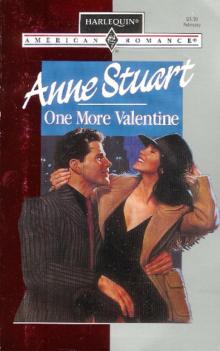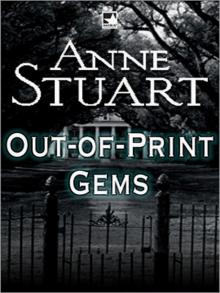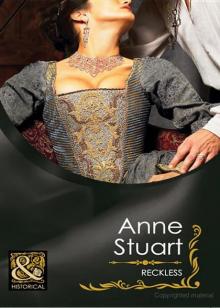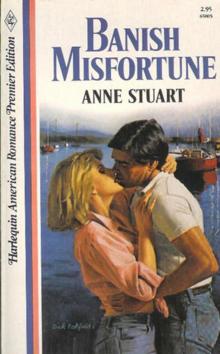- Home
- Anne Stuart
Crazy Like a Fox Page 5
Crazy Like a Fox Read online
Page 5
“I’ve brought the irises . . . oh, hullo there, Margaret.” Uncle Remy had appeared, laden with more gardening tools and sacks, a huge straw hat protecting his balding head from the sun. “Did you sleep well?”
“I had nightmares,” Margaret said, flashing a look at Peter, whose expression was bland. In point of fact she’d slept well, a deep, heavy sleep untroubled by visions of murderers or ancient grief.
“Too bad,” Remy murmured. “I’ll fix you up with a hot toddy tonight—that’ll help you sleep.”
“Stop trying to turn everyone into a drinking partner, Uncle,” Peter drawled. “Your hot toddies would probably give anyone nightmares.”
“Do you like gardening, my dear?” Remy inquired, ignoring his nephew’s comment. “I can find another trowel for you.”
Margaret shook her head. Uncle Remy was still dressed in a spotless white suit, his silk tie carefully knotted beneath his sagging jowls, but he clearly had every intention of joining in the digging. Peter had dressed for the occasion, his old jeans caked with mud at the knees, his khaki shirt open at the throat, the sleeves rolled up, exposing muscular forearms, dusted with golden hair.
“I’ll just watch,” she said, averting her gaze to her daughter’s general state of grubbiness. It didn’t matter how clean Carrie started out the day; within minutes she was covered with a layer of dirt, her clothes were torn and her sneakers unlaced.
“Go away, Cousin Margaret,” Peter said. “Uncle Remy will see that I don’t have a fit. Besides, you can watch us from the drawing room if you’ve a mind to. Go keep Grandmère company and let us work.”
“Yes, my dear,” Remy said, kneeling on a folded newspaper, the toes of his shoes poking into the dirt. “We’ll be fine. Believe me, there’s nothing to worry about.”
“Yeah, Ma. Go away,” Carrie said frankly with the devastating directness of youth. “Gimme some space.”
“Give me a break,” Margaret shot back. “If your grandmother heard you talk like that you’d be in very big trouble,” she said. “Behave yourself, young lady. I’ll be watching from that window over there.”
“We get the message, Margaret,” Peter said. “Now go away.”
If she’d been a more certain of herself she would have grabbed Carrie’s arm and dragged her away from the garden, Margaret thought, retreating ignominiously. She had friends who were so uncompromising, so certain they were always right that they never experienced self-doubt. She’d always envied them, but never more so than at the moment. She couldn’t rid herself of the feeling that she was the one who was acting unfairly, whose suspicions were unfounded.
There was no sign of Gertrude when Margaret arrived back in the formal drawing room, a fact for which she was profoundly grateful. She wasn’t in the mood to face the tiny tyrant right then. She was still coming to terms with her own mixed emotions.
She went straight to the tall, multi-paned window French door that opened onto the veranda. Sure enough, she had a clear view of the three in the garden. She leaned her head against the pane, sighing, and in that moment Peter looked up. The other two were intent on their gardening, unaware of her presence in the window, but not Peter. Even from that distance his green eyes looked into hers, and there was no mocking smile on his mouth. He just stared for a long moment, and she stared back, unable to help herself.
“He’s not going to hurt your daughter.” Gertrude’s voice broke into her dreamlike concentration. “I would never have invited you here if there was a question of my only great-grandchild being in danger. You should trust me at least that much.”
Slowly Margaret turned to face her. How a petite woman with a cane could have sneaked up on her was beyond her comprehension, but she was beginning to learn that Gertrude Delacroix could do anything she wanted. “He’s your grandson,” she said. “You’ve known him all his life. Wouldn’t he come first in your concerns?”
“I have other grandchildren. I have only one great-grandchild, and the only thing more important than family is heritage. Making certain the next generations are coming along to carry on the family tradition, the family name.”
“What makes you think Carrie won’t marry?”
“Of course she will. And she’s strong willed enough to make her husband change his name to Delcroix. If she wants to inherit Maison Delacroix she’ll have to do that.”
“Carrie is only nine years old. I don’t think we need to worry about her marriage plans,” Margaret said wryly.
“It never hurts to look ahead. I don’t expect to be alive when she marries. I’m eighty-six now, and while I come from a long-lived family I can’t count on anything. Do you believe me?” she said abruptly.
“Believe that you’re eighty-six?” Margaret said, momentarily confused.
“Fool,” Gertrude said genially. “Do you believe that your daughter is safe around Peter?”
Margaret looked down at the three of them in the garden. Carrie was chatting away at record speed, looking up at Peter with something akin to hero worship. Margaret tried to summon up suspicions, doubts, misgivings, panic. All she could manage was that peculiar sadness she’d felt earlier that Carrie’s own father had never been there for her.
“I believe you,” she said finally, turning away and sitting down in one of Gertrude’s uncomfortable chairs, no longer needing to watch her child. “Where’s his guard?”
“His guard?”
“I saw a man with a gun coming downstairs yesterday afternoon. Mrs. McKinley said he was hired to watch Peter.”
“You must mean Georges. He comes and goes. Peter doesn’t usually require constant supervision, just an occasional check. Georges and Lackey, his partner, are here about four hours a day. I think they spend their time playing poker with Peter.”
“If Peter’s harmless, why do they carry guns?”
“Most men carry guns in this area. Part of their machismo, I’m afraid. Our ancestors carried swords and spent a great deal of their adult life dueling. This is just a carryover from such juvenile behavior. Besides, Georges and Lackey are security men. They’re supposed to carry guns.”
“Have they ever had to use them?”
“Certainly not with Peter. Do you think he’d be allowed to remain at home if he was considered any sort of threat? Don’t be ridiculous,”. Gertrude scoffed.
Margaret surveyed her stonily. “So what you’re trying to tell me is that I’m being paranoid, is that it? That I’m overreacting to the entire situation.”
Gertrude shrugged, and the gesture reminded Margaret of how very French that part of Louisiana was. “I understand that you feel protective of the little one. But it was a crime of passion, a moment of insanity, years ago. It’s not going to happen again.”
“A moment of insanity?” Margaret instantly picked up on the phrase. “I thought it was a permanent state.”
Again Gertrude shrugged. “It comes and goes. Usually he’s perfectly fine. When things get worse, he goes off for treatment at a private institution. Believe me, he’s monitored quite closely.”
Margaret rose, striding back over to the window to look down at the three gardeners. A fourth had joined them, standing some distance away. It was the armed guard from the day before. He was smoking a cigarette, paying little attention to the industry around him.
Peter’s head was bowed over the dirt, and she could see his hands, slender, strong hands, caked with fresh mud. He didn’t look like a man who needed to be monitored closely, but that was something she had to remember. He wasn’t what he appeared to be.
She turned back to Gertrude. “I’ll have to trust you.”
“And you don’t like that one bit, do you? You’re not used to trusting people,” the old lady said shrewdly.
“It’s easier if you only count on yourself. That way you know where you stand.” She shook her head, as if to clear
any momentary weakness from it. “When can I start work with Wendell?”
“You’ll have to discuss that with him. I’m not sure when he’ll be back. He’d planned to spend the weekend in New Orleans, but he might have changed his mind. He hadn’t met you when he first decided to go.”
Margaret felt real alarm sweep through her as she realized what the old woman was insinuating. “I have no intention of getting married again, Gertrude,” she told her.
“That’s what all widows say.”
“Gertrude . . .”
“Enough,” the old lady said. “I’m going to lie down and take a little nap. I find I need catnaps frequently to keep my stamina up. If you wish to sit quietly in the corner you may join me. Otherwise go away.”
Margaret didn’t need to be asked twice. With a last, worried look out the living room window, she left, closing the door quietly behind her.
“GIN,” SAID PETER, tossing his cards down on the table with more negligence than triumph.
“Hell and damnation,” Georges muttered, pushing the pile of money in Peter’s direction. “You always beat me. It’s not fair. You take my money and you can’t even spend it.”
Peter grinned. “Don’t worry about it, Georges. I cheat.”
“Yeah, but so do I,” Georges said, shuffling the cards. “Mind if I smoke?”
“Mind if I light it?” Peter countered.
“Try it and I’ll break your arm,” Georges said affably. “What do you think of the new lady? She’s a pretty thing.”
Peter felt a sudden surge of anger along with a detached surprise. Why should he feel jealous of Georges’s attraction to Margaret Jaffrey? A man would have to be half-dead not to notice that the widow was indisputably hot. More important, why should he feel more jealousy than he’d ever felt for his late, unlamented, alley-catting wife?
With his usual self-control he tamped down the emotion. “You’re a happily married man, Georges, with six children. What would Yvette say?”
“Yvette would say she’s glad I’m still man enough to look, and smart enough not to touch. Don’t give me that look, Peter. I’ve known you too long to be fooled by you.”
“Don’t count on it,” Peter said. “Just because we grew up together doesn’t make you privy to my inmost thoughts.”
“No, but it makes me able to know when you’re interested in a woman.”
“Shit, I’ve been locked up here for two years. I’d be interested in anything as long as it wore a skirt.”
Georges shook his head. “Not good enough, my friend.”
“She isn’t my type, Georges.”
“I expect your tastes have changed in the past two years,” Georges said sagely.
“They’ve become a hell of a lot more catholic, that’s for sure,” Peter agreed. “Listen, I really don’t want to discuss my love life, or lack thereof, and I don’t want to sit around thinking about her long legs and red hair—” He sighed. “Damn you, Georges.”
George’s sighed. “How’d you ever wind up in such a mess? You had everything going for you.”
It was a question Georges asked far too often. They’d been fishing buddies during their childhood, drinking buddies in college, but somewhere along the way their lives had taken widely divergent paths, only to meet up again in the attics of Maison Delacroix.
“I married the wrong woman,” Peter said, his voice weary.
Georges had never liked Rosanne Delacroix, with her big-city ways and her flirtatiousness, and she hadn’t liked him, sensing his disapproval. “I’d say you did, my friend. Better you should have waited for someone like Margaret.”
“If I’d known . . .,” Peter began, letting the thought trail. “Give me that damned cigarette.”
Georges looked at him askance but made no move to stop him when he ripped the cigarette out of his hand. Peter took a deep drag, pulling the smoke into his lungs and sighing with a bittersweet longing. That was just one more thing he’d had to give up when he’d been arrested for Rosanne’s murder. He’d always told himself he was glad something had forced him to stop his pack-a-day habit, but he would have preferred something a little less drastic than a murder trial.
He took another deep drag, choking a bit as the unfamiliar smoke curled around his lungs, then reluctantly handed the cigarette back to the watchful Georges. “Don’t worry, I won’t set anything on fire when you’re around,” he said wryly. “You have your professional reputation to uphold.”
“You mean it’s up to you whether you set fires?” Georges demanded, his eyes narrowing. “You can control it?”
Peter almost grabbed the cigarette again, but Georges had stubbed it out. He’d forgotten, of course. He wanted to trust someone, anyone. But if someone shared his trust, they shared his burden, and he couldn’t let that happen.
Instead he shrugged. “It depends on my mood. Want to try me?” He reached for George’s lighter, but it was quickly snatched out of his reach.
“Don’t play games with me, Peter.”
For a moment he let the silence run out. And then he spoke. “Georges, my friend, sometimes I have no choice.”
Brown eyes looked into green, one old friend to another, for a long moment, and then Georges nodded, a brief, dismissing motion, as he picked up the pack of cards. “Time for me to earn some of that money back. You think about Margaret’s long legs, and I’ll take advantage of your distraction.”
“Don’t count on it. I can think of her long legs and still beat you.” Sorting his cards, he picked up a new one, discarded an old one and laid the rest down on the table. “Gin.”
“NOT BAD,” MRS. McKinley allowed after tasting Margaret’s chicken tarragon. “Not what we’re used to around here, but not bad. I thought the only thing Yankees could make was boiled dinners.”
“I’m not a Yankee. I come from Wisconsin originally,” Margaret protested, wallowing in what she instinctively knew was high praise from the grudging housekeeper.
“Honey, anything north of the Mason-Dixon line is Yankee country,” she said, serving up a portion and placing it on the fancy tray she’d set with china and crystal and linen. “You can take this up to Peter while I finish up in here. The key’s on the tray.” She thrust it into Margaret’s unwilling hands, moving away before Margaret could return it.
“Take it up to Peter?” she echoed, sounding like an idiot. “I thought he ate with the family.”
“Only if he’s feeling tolerant,” Mrs. McKinley muttered. “Seldom two nights in a row. Go ahead. I’ll be serving dinner in another fifteen minutes, and Gertrude doesn’t like anyone to be late.”
Still Margaret didn’t move. “Who usually takes his dinner up?” she asked, noting and accepting the trace of desperation in her voice.
“One of the guards if they’re on duty. Or I do.” She fixed Margaret with a menacing glare. “I climb two long flights of stairs with my bad ankles, carrying a heavy tray. Are you suggesting I do that again tonight?”
“I’ll be right back,” Margaret said, retreating through the door hurriedly, the tray clutched in her hands.
She didn’t blame Mrs. McKinley for not wanting to climb the stairs, she thought as she started up the second flight. The china and silver weighed a ton, the mahogany tray was no featherweight, and two flights of stairs was enough to wind anyone.
The third floor was a far cry from the lower ones. The hallway was small and dark, with a plain modern door fitted with an impressive lock. Margaret could hear noise beyond the locked door, the sound of someone moving around up there, and she bit her lip. The tray was making a lot of noise, she thought, the silverware clinking against the china as her hands shook.
“Don’t be an idiot,” she whispered to herself, balancing the heavy tray on one knee and picking up the key. “He’s harmless. Everyone’s told you so.” But she st
ill had much too much trouble fitting the key in the lock.
If he was kept locked in, how had he managed to accost her in the hall the night before? She didn’t really want to know. The lock was stubborn, sticking for a moment, and she was tempted to give the door a kick. She rattled it, more in temper than with the hope she might accomplish anything, but it finally gave, swinging open onto a spacious room.
At that moment she wasn’t paying any attention to interior decor. All her attention was fixed on Peter, who was sitting in the middle of a modular sofa, staring at her.
“What’s this?” he demanded, not moving.
Well, the hell with him, she thought, her hands no longer shaking. “Dinner,” she replied tartly, stepping into the room.
“And what are you, dessert?” he said, his eyes narrowed.
She set the tray down with a thump on the glass-topped coffee table. “Don’t count on it.” Then she stood up, acutely aware of his eyes.
“A dinner companion?” he suggested, and there was a trace of wistfulness behind his bad temper.
“Guess again.”
“What was that line from Rambo? My worst nightmare?”
She couldn’t help it—she laughed. “That’s closer to the truth. Enjoy your dinner.”
She heard his laugh follow her down the stairs, and it wasn’t until she came smack up against Lisette that her unexpected good humor vanished.
Chapter Five
“WHAT WERE YOU doing up there?” Lisette’s voice bordered on shrill.
Margaret bit back her first, instinctive reply. After all, she had to live with Lisette, at least for a while, and she could afford to swallow her irritation. “Delivering Peter’s dinner.”
“What’s wrong with Mrs. McKinley?”
“Her arthritis is bothering her.”
“The day Mrs. McKinley can’t climb two flights of stairs will be the day I give up men. In other words, it’ll be a cold day in hell. I’m surprised you were able to talk her into it. Peter’s always been her favorite. The rest of us she just tolerates, but Peter’s got a special place in what passes for her heart.”

 Ice Blue
Ice Blue Seen and Not Heard
Seen and Not Heard Never Marry a Viscount
Never Marry a Viscount Heartless
Heartless The Devil's Waltz
The Devil's Waltz Hidden Honor
Hidden Honor Silver Falls
Silver Falls Fire and Ice
Fire and Ice Nightfall
Nightfall Never Trust a Pirate
Never Trust a Pirate The Soldier and the Baby
The Soldier and the Baby Still Lake
Still Lake Reckless
Reckless The Spinster and the Rake
The Spinster and the Rake Winter's Edge
Winter's Edge At the Edge of the Sun
At the Edge of the Sun Into the Fire
Into the Fire Night of the Phantom
Night of the Phantom Ritual Sins
Ritual Sins Darkness Before the Dawn
Darkness Before the Dawn Against the Wind
Against the Wind Ruthless
Ruthless The Catspaw Collection
The Catspaw Collection Escape Out of Darkness
Escape Out of Darkness The Widow
The Widow Shameless
Shameless Black Ice
Black Ice Breathless
Breathless Shadows at Sunset
Shadows at Sunset Falling Angel
Falling Angel Housebound
Housebound Cold as Ice
Cold as Ice The Wicked House of Rohan
The Wicked House of Rohan Lord of Danger
Lord of Danger The High Sheriff of Huntingdon
The High Sheriff of Huntingdon Wildfire
Wildfire Moonrise
Moonrise The Demon Count's Daughter
The Demon Count's Daughter Date With a Devil
Date With a Devil To Love a Dark Lord
To Love a Dark Lord Driven by Fire
Driven by Fire Special Gifts
Special Gifts Ice Storm
Ice Storm Shadow Lover
Shadow Lover A Dark & Stormy Night
A Dark & Stormy Night Now You See Him...
Now You See Him... Lady Fortune
Lady Fortune Glass Houses
Glass Houses A Rose at Midnight
A Rose at Midnight Prince of Swords
Prince of Swords One More Valentine
One More Valentine Return to Christmas
Return to Christmas Tangled Lies
Tangled Lies Consumed by Fire
Consumed by Fire The Fall of Maggie Brown
The Fall of Maggie Brown Wild Thing
Wild Thing Crazy Like a Fox
Crazy Like a Fox The Demon Count
The Demon Count Prince of Magic
Prince of Magic Wildfire (The Fire Series Book 3)
Wildfire (The Fire Series Book 3) Anne Stuart's Out-of-Print Gems
Anne Stuart's Out-of-Print Gems Shadow Dance
Shadow Dance Under an Enchantment: A Novella
Under an Enchantment: A Novella Demonwood
Demonwood Blue Sage (Anne Stuart's Greatest Hits Book 3)
Blue Sage (Anne Stuart's Greatest Hits Book 3) Barrett's Hill
Barrett's Hill Angel's Wings (Anne Stuart's Bad Boys Book 5)
Angel's Wings (Anne Stuart's Bad Boys Book 5) Darkness Before Dawn
Darkness Before Dawn The Right Man
The Right Man The Houseparty
The Houseparty Reckless_Mills & Boon Historical
Reckless_Mills & Boon Historical Banish Misfortune
Banish Misfortune Angel's Wings
Angel's Wings Chain of Love
Chain of Love Consumed by Fire (The Fire Series)
Consumed by Fire (The Fire Series) Partners in Crime (Anne Stuart's Bad Boys Book 4)
Partners in Crime (Anne Stuart's Bad Boys Book 4) The Soldier, The Nun and The Baby (Anne Stuart's Greatest Hits Book 2)
The Soldier, The Nun and The Baby (Anne Stuart's Greatest Hits Book 2)